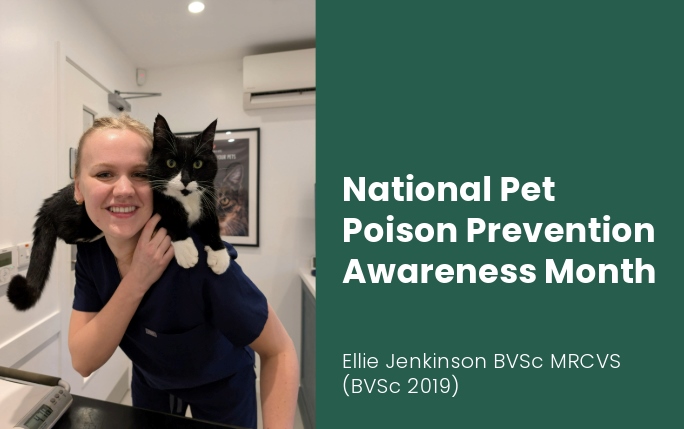National Pet Poison Prevention Awareness Month: Ellie Jenkinson

To mark National Pet Poison Prevention Awareness Month, we’re speaking to members of our alumni community to raise awareness about the hidden dangers lurking in our homes and environments that could put our pets at risk.
The month serves as a reminder for pet owners to stay informed, take precautions, and know what to do in case of an emergency. With the help of veterinary professionals, we can all play a part in keeping our beloved pets safe and healthy.
We spoke to Ellie Jenkinson (BVSc 2019), who has experience in Emergency Critical Care (ECC), medical and clinical pathology. In this profile, Ellie shares her encounters with accidental pet poisonings, and top tips to protect against them.
Do you have any memories from your time as a vet student at Liverpool to share?
I graduated from Liverpool in 2019 and still have a deep love for the city and people living there. My partner is from the Wirral, we still get the 487 bus into the city centre for old times’ sake when we visit!
I have cherished memories of living in Neston during rotations, we all came together as a year group, and everyone seemed to be friends with everyone. Running events at Lord Trees bar, going for long dog walks and having roast dinners on Sundays were the highlight of my week. I also had the privilege of studying at the University of Helsinki Faculty of Veterinary Medicine for a term as part of the Erasmus+ project, where I had the opportunity to travel and meet fellow vet students from across Europe.
Did anyone inspire you when you were a student?
During my preclinical years Alison Reed always had such an expansive knowledge and enthusiasm for small animal general practice. She inspired interest in everything she lectured and is an excellent role model for what a great general practitioner looks like.
We didn’t necessarily receive any specific ECC teaching, but I was a bit of a nerd and attended every lecture going. From soft tissue surgery to internal medicine, I wanted to learn it all! I started developing an interest in ECC during my final year after seeing practice at Vets Now Liverpool. It seemed like all the exciting cases presented overnight, offering medical and surgical challenges at every turn. The thought of being presented with a critically unwell patient, to make a diagnosis then start treatment all in the same shift was very appealing.
Tell us about your career to date. What inspired you to work in ECC, and how often does your work involve treating accidental poisonings?
Upon graduation I completed a 13-month internship at Vets Now Manchester hospital. It started as a rotating internship, but with the advent of the Covid-19 pandemic we became a first-opinion emergency clinic. Weekly admissions for myotoxicity, cannabis ingestion and good old chocolate ingestion were considered routine cases.
Following this I have worked in general practice, night work and at an emergency hospital in Singapore. It has taken me a while to find the right work-life balance, while still feeling challenged and excited by my day-to-day work.
Working in a hospital during the day means accidental poisonings are less common than when I worked nights. But the occasional curveball still presents as an emergency, from ingested fentanyl patches to chewed salbutamol inhalers.
What are some common toxins that pet owners may not realise are dangerous?
Some common household items such as leave-on patio cleaners, diffusers with essential oils and even batteries can have serious health consequences for pets. The phrase ‘the dose that makes the poison’ encompasses the approach to toxicology, that anything can be toxic if overdosed – even water.
What is one piece of advice you’d give to pet owners to prevent accidental poisonings?
Even if you think your pet won’t come into contact with a possible toxin, always play it safe. Never assume that your furry friend won’t be interested in it (I’m looking at you, cats and lilies). Put it in a cupboard, or on a shelf, or maybe just don’t even risk having it in the house if you can live without it!
What’s the most unusual thing you’ve heard of a pet eating (that they really shouldn’t have)?
During my internship we performed an exploratory laparotomy with multiple enterotomies on a dog that managed to swallow a meter of tinsel the week before Christmas. Typically, the patient belonged to a staff member. We ended up being interviewed for the local news and were even featured in a newspaper in China. There are some other truly disgusting things that I have seen dogs eat, that I probably cannot share here!
Thank you, Ellie, for helping us celebrate National Pet Poison Prevention Awareness Month. If you’d like to share your own veterinary career journey or professional reflections with the University of Liverpool Veterinary Alumni Association, we’d love to hear from you via ulvaa@liverpool.ac.uk.